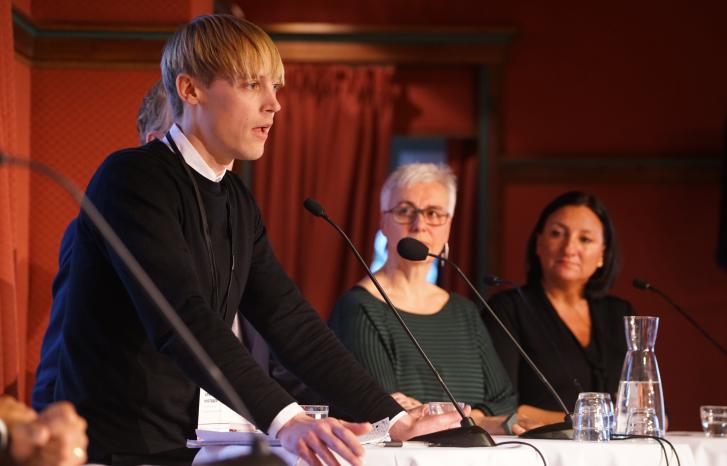The Storting has approved a trial scheme that introduces tenure track positions for researchers. Originating in the US, “tenure track” is a scheme to recruit the absolute best researchers based on the concept of “excellence” in research, using certain measurable, objective criteria.
According to the University of Oslo’s newspaper Uniforum, tenure track positions are also thought to give young researchers a more secure career path in the establishment phase, and may help to improve the gender balance in academia. So far, Norwegian academic institutions are less than enthusiastic about the scheme.
“They say it’s possible for everyone to become a top researcher, as long as they work hard enough. But in practice it’s easier for men than for women to fulfil the requirements,” says researcher Rebecca Lund.
She has studied the consequences of the tenure track scheme and what she calls the “ideal academic” in a gender perspective. The starting point for her study is her own workplace, Aalto University in Helsinki.
“Expectations arising from gender stereotypes and unequal access to informal networks make it more difficult for women than men to build the CV required to gain access to tenure track positions.”
The ideal academic
Lund explains that the steering document for the tenure track scheme at Aalto University contains the concept of the ideal academic, which all researchers should strive to achieve. Liisa, one of the researchers interviewed in Lund’s study, describes the ideal academic like this:
“You have to be good in all areas of academic work. Both research and teaching. But research is what counts, and the expectation is that you must publish in many high-quality journals, of course. And work mostly with international colleagues. Nothing that has to do with Finland counts. And you should write in English. You need to do ‘networking’ with some of the best universities so it looks good and appears that you’re conducting world-class research.”
The emphasis on excellence, which is closely related to the concept of the ideal academic, is viewed in connection with a certain kind of masculinity, not unlike what is found in multinational corporations, Lund asserts.
This implies a 100 percent commitment to achieving the organization’s goals – in this case “world-class research”, avid networking, and being open to new adventures anywhere in the world.
Few women in tenure track positions
In other words, junior researchers must dedicate their entire lives to their careers to succeed under the tenure track scheme.
“This is something many women under 40 can’t do,” Lund asserts. She points out that women take most of the parental leave, which means they are absent from work more than men. Women also hold the majority of part-time positions in academia and have more teaching duties.
In addition, statistics show that there are very few women in tenure track positions at Aalto University. From 2000 to 2011, the university hired 85 researchers for tenure track positions. Only 18 percent of the applicants were women, and 16 percent of the positions went to women. In comparison, women comprise about half of the doctoral research fellows in Finland.
Criteria favour men
Under the Norwegian trial scheme, the candidates for tenure track positions are employed in a temporary status for six to eight years, and are evaluated throughout this period according to certain measurable criteria.
The candidates who fulfil the requirements will be hired in a permanent position at the end of the period, either as an associate professor with the opportunity for promotion to professor or in a research and teaching position.
This applies to 300 positions at present, but no additional funding comes along with the new scheme.

Particular criticism has been directed at the rule that no more than five years may have passed since the applicants for tenure track positions defended their thesis, according to the independent online newspaper at the University of Bergen På Høyden. The Centre for Women’s and Gender Research in Bergen argues in a news story that this rule may be especially unfavourable for women:
“For many candidates this is a period in their lives when they are giving birth and caring for small children – a phase that generally occupies women’s time, work capacity and attention more than men’s. As a result, the five-year rule may more negatively affect women’s ability to publish than men’s. It may also impede women’s progress with regard to the other criteria that candidates are measured by over time.”
Other expectations of women
Lund says that women are also expected to perform more care-related activities, including at the workplace.
A male researcher she interviewed explained how the younger women in his department helped to create a sense of community by arranging get-togethers with coffee and cake once a week. When these women were not there, for example during maternity leave, the other employees went back to closing their doors and keeping to themselves.
“Although he thought it was unfortunate, he still didn’t take the initiative himself to arrange similar gatherings. He was too busy with his work,” says Lund.
See also: Few women leaders in the research institute sector
Invisible work
She thinks the expectation that women must assume more responsibility for the “invisible” work may make it more difficult for women to find time to write and publish.
“The distinction between visible and invisible work also corresponds with ideas about masculinity and femininity. Although women can participate in typically male practices and vice versa, the gender stereotypes are reproduced in subtle and often unconscious ways,” she says.
Teaching counts less
Rebecca Lund is critical of the evaluation system that tenure track positions are based on. The focus on measurable, objective criteria determines what kind of academic work and experience is emphasized, and indirectly what kind of work doesn’t count,” she states.
“It’s important for a researcher to publish in prestigious journals, but it’s hardly the only thing a researcher does. Many women spend more time teaching and advising students, even though those activities are valued less in the evaluations. As a result, this kind of work goes unnoticed.”
“In order for some to be ideal academics, others must teach, plan curriculum, follow up students and do the care-related activities – at the university as well as at home,” says Lund.
Conflict between “want” and “should”
Many of the researchers Lund interviewed said that what they “should” do if they want to have a career often conflicts with what they “want” to do as researchers.
“They feel there’s a conflict between what’s important and meaningful to them – writing their thesis, conducting research, reading, developing course curriculum and teaching – while at the same time playing a rigid, streamlined game according to rules set out in the university’s strategy and steering documents,” says Lund, who gives an example:
“Researchers are encouraged to take a sabbatical abroad. But should they choose a less well-known university that has the best research environment for what they are most interested in or a prestigious university even though the research environment there is less relevant for their own work?”
“Of course, choosing the prestigious university looks best on your CV.”
Different strategies
Lund explains that the researchers at Aalto University had different strategies and views on the ideal academic and the concept of excellence.
Some embraced it, some complied without fully supporting it, and others showed open defiance – through, for example, critical seminars and blogs.
No matter their approach, all researchers are held responsible, regardless of whether or not they are part of the tenure track system.
“Researchers who don’t participate enough in the activities that count simply won’t get a job in academia,” says Lund.
Academic power struggles
According to the researcher, the standard for what is regarded as academic quality is a product of power struggles.
“There is power in defining what should count as academic quality. The ideal academic is a product of these power struggles, but is presented as neutral knowledge and objective standards,” she says.
“Researchers, including myself, are caught up in an illusion that only credentials and abilities determine the outcome of the competition for positions and funding, even though we know it’s not so simple.
Translated by Connie Stultz.
See also: Can good leadership solve academia's gender and diversity problems?
- Rebecca Lund is a doctoral research fellow at the Aalto University School of Business in Helsinki, Finland.
- As part of her doctoral thesis, she has interviewed about 30 teachers, researchers and administrative staff at her own institution.
Aktuelle lenker
Lund has contributed the chapter Akademia. “Idealakademikeren” og kvinnelige akademikeres hverdag (“Academia. The ‘ideal academic’ and female academics’ daily life”) in the new anthology I hjertet av velferdsstaten. En invitasjon til institusjonell etnografi (“In the heart of the welfare state. Seeking an institutional ethnography”).
Lund’s chapter is based on an article from her forthcoming doctoral thesis.
The book has been edited by Karin Widerberg, a professor in the Department of Sociology and Human Geography at the University of Oslo.


